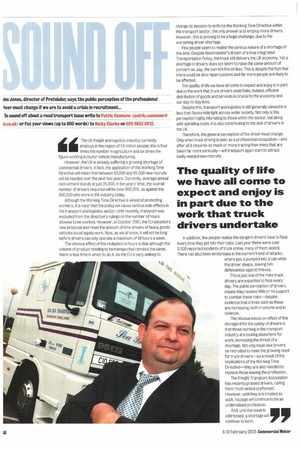6 e T rn h e pl U oy K s fre i o i t g h h e t r a e n g d i o lo n g o i s f t l i c 6 s m i n i d i i i u o s o t ry o e c o u p r i e re t n h t ilys is four
Page 46

If you've noticed an error in this article please click here to report it so we can fix it.
times the number in agriculture and six times the figure working in motor vehicle manufacturing.
However, the UK is already suffering a growing shortage of commercial drivers. In fact, the application of the Working Time Directive will mean that between 50,000 and 80,000 new recruits will be needed over the next two years. Currently, average annual recruitment stands at just 25,000. In ten years' time, the overall number of drivers required will be over 600,000, as against the 500,000 who work in the industry today.
Although the Working Time Directive is aimed at protecting workers, it is clear that the policy will cause serious side-effects in the transport and logistics sector. Until recently, transport was excluded from the directive's rulings on the number of hours allowed to be worked. However, in October 2001, the EU adopted a new proposal and reset the amount of time drivers of heavy goods vehicles could legally work. Now, as we all know, it will not be long before drivers can only operate a maximum of 48 hours a week.
The obvious effect of this reduction in hours is that although the volume of product needing to be transported remains the same, there is less time in which to do it. As the EU is very unlikely to change its decision to enforce the Working Time Directive within the transport sector, the only answer is to employ more drivers. However, this is proving to be a huge challenge, due to the worsening driver shortage.
Few people seem to realise the serious nature of a shortage of this kind. Despite Westminster's dream of a true Integrated Transportation Policy, the truck still delivers the UK economy. Yet a shortage in drivers does not seem to raise the same amount of concern as, say, the current fire strikes. This is despite the fact that there could be dire repercussions and far more people are likely to be affected.
The quality of life we have all come to expect and enjoy is in part due to the work that truck drivers undertake. Indeed, efficient distribution of goods and services is crucial to the economy and our day-to-day lives.
Despite this, transport and logistics is still generally viewed in a less than favourable light across wider society. Not only is this perception highly infuriating to those within the sector, but along with spiralling costs, it is also contributing to the lack of drivers in the UK.
Therefore, the general perception of the driver must change. Only when truck driving is seen as a professional occupation—and after all it requires as much or more training than many that are taken far more seriously—will transport again start to attract badly needed new recruits.
In addition, few people realise the dangers drivers have to face every time they get into their cabs. Last year there were over 3,500 reported incidents of truck crime, many of them violent. There has also been an increase in the current trend of attacks, where gas is pumped into a cab while the driver sleeps, leaving him defenceless against thieves.
This is just one of the risks truck drivers are expected to face every day. The public perception of drivers means they receive little or no support to combat these risks—despite evidence that crimes such as these are increasing, both in volume and in violence.
The obvious knock-on effect of this disregard for the safety of drivers is that those working in the transport industry are looking elsewhere for work, increasing the threat of a shortage. Not only must new drivers be recruited to meet the growing need for truck drivers—as a result of the implications of the Working Time Directive—they are also needed to replace those leaving the profession.
The Freight Transport Association has recently praised drivers, Gang them 'multi-skilled craftsmen'. However, until they are treated as such, haulage will continue to be an undervalued profession.
And, until the issue is addressed, a shortage will continue to loom.




























































































































































